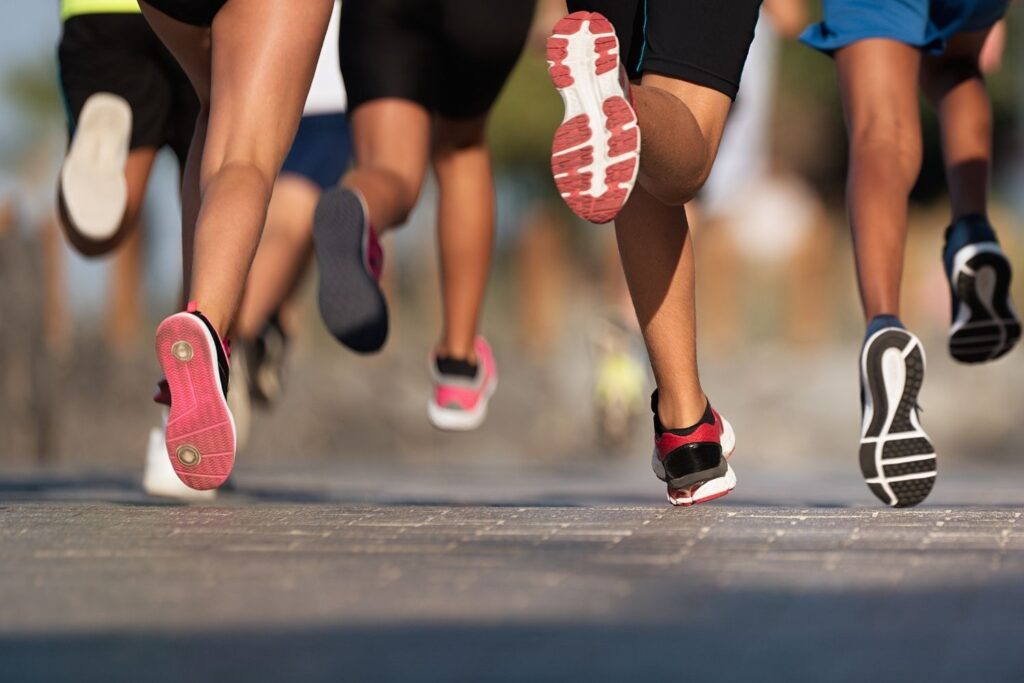So, you’ve signed up for a marathon. First of all, congratulations! Race day is upon you, and whether you’re aiming to shatter records or just hoping not to be carted off in an ambulance, I’ve got you covered with some practical tips to help you cross that finish line with some of your sanity intact.
1. Hydration: The Real MVP
You’ve probably heard it a thousand times: drink water. Well, I’m here to say it a thousand and one. Hydration is vital – not just on race day but in the days leading up to it. Dehydration will make those 42.2 kilometres feel like a desert trek (Chorley et al., 2012).
However, don’t go overboard and guzzle water. Overhydration, or hyponatremia, can be just as dangerous as dehydration. It’s crucial to find the right balance between being hydrated and spending the entire race searching for the next portable toilet (Hew-Butler et al., 2015). Sip water and electrolytes strategically and trust your training.

2. Pacing: Slow Down (Initially!)
The starting line is exciting. The energy, adrenaline, and the overwhelming temptation to sprint off the start are hard to resist. But resist, you must. The first few kilometres will feel like a breeze, and it’s easy to get carried away.
However, 10 kilometres in, when you’re cursing the decision to sign up for this, you’ll be thankful for pacing yourself. The marathon is not a sprint—it’s a long-distance event (Tandogan et al., 2017). Start slow, find your rhythm, and remember that no one cares if you’re the first to hit the 5-kilometer mark.
If during the first half you think, “This feels too easy,” slow down—there’s still a lot of road ahead.

3. Nailing Nutrition: The Balance Between Fuel and Fun
Race day breakfast is critical. It’s not the day to experiment with that “superfood chia-oat-bar” your friend raves about. Stick with what you know works for your stomach. You don’t want to spend the race regretting your breakfast (Asker Jeukendrup et al., 2011).
During the race, nutrition is even more important. Gels, chews, and bananas can be lifesavers. Don’t wait until you feel exhausted to refuel – by then, it’s too late. Begin fueling early and keep it consistent. A good rule of thumb is to consume carbs every 45 minutes to an hour (Burke, 2007).
And if spectators offer you lollies? Always accept!

4. The Mind Game: Running Is (Mostly) Mental
Running a marathon is just as much a mental challenge as a physical one. Around kilometre 30, you’ll likely hit the dreaded “wall”—the moment when your body says, “We’re done,” and your mind insists, “Still 12 kilometres to go!” (Buman et al., 2008). This is when mental toughness becomes essential. You’ll need to dig deep and perhaps give yourself a motivational pep talk.
Breaking the race into smaller goals helps. Don’t think, “12 kilometres to go.” Instead, focus on reaching the next kilometre marker or aid station. These little victories can keep you moving forward (Schüler et al., 2013). If you can manage it, smiling—even if it’s more of a grimace—can trick your brain into thinking you’re enjoying yourself (Lane et al., 2012).
5. The Finish Line: Finally!
Ah, the mythical finish line! By kilometre 40, you’ll start fantasizing about crossing it, imagining yourself as a triumphant marathoner, wind in your hair, victory smile beaming. And when you finally get there, you’ll likely hobble across, wondering why you ever signed up.
But no matter how you feel, you’ll have done it! You’ve conquered 42.2 kilometres. Soak in the moment, celebrate your achievement, and most importantly, keep moving. Don’t collapse immediately – your muscles will thank you later if you take a few minutes to walk and cool down (Nye et al., 2019).

Whether it’s your first marathon or your 10th, race day is a wild, incredible journey. Follow these tips, trust your training, and most of all, enjoy the run. After all, it’s not every day you get to spend several hours sweating with strangers and call it an accomplishment.
References:
- Asker Jeukendrup, A. E., et al. (2011). Carbohydrate ingestion during exercise: effects on performance, training adaptations and trainability. Sports Medicine.
- Buman, M. P., et al. (2008). The mental and physical challenges of marathon running. Journal of Sports Science.
- Burke, L. M. (2007). Nutrition strategies for the marathon. International Journal of Sports Nutrition.
- Chorley, J. N., et al. (2012). Hydration and performance: a review. Journal of Sports Health.
- Hew-Butler, T., et al. (2015). Exercise-associated hyponatremia. British Journal of Sports Medicine.
- Lane, A. M., et al. (2012). The effectiveness of self-talk strategies on marathon running. Psychology of Sport and Exercise.
- Noakes, T. D. (2003). The lore of running. Oxford University Press.
- Nye, R., et al. (2019). Post-marathon recovery strategies. Journal of Physical Therapy.
- Schüler, J., et al. (2013). Motivation and mental toughness in marathon running. European Journal of Sport Science.
- Tandogan, H. T., et al. (2017). Optimal pacing strategies in long-distance running events. Journal of Sports Science.

